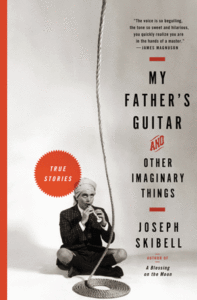Reviewed by NEAL GENDLER
Perhaps Joseph Skibell’s unusual approach to life’s occurrences is related to his family’s unusual pronunciation of the truncated version of its European name.
Americanized — sort of — Skibelski became, “against all orthographic convention,” SKY-bell, which, the author says, almost everyone mispronounces.
The author of My Father’s Guitar and Other Imaginary Things also has experiences and views that are not always conventional, as shown in this little 16-piece dessert of a book. The liner notes claim that “these stories are 100 percent true,” but Skibell says early on that “my sisters have always insisted, especially when it comes to family history, that my grasp of reality is… less than firm, that for me, memory and imagination are like two converging rivers.”

They say he misremembers things — or makes them up. “Even I will admit that the two of them seemed to have grown up in an entirely different household from mine,” he says.
So we have to take Skibell’s word about accuracy.
In the title chapter, he realizes that his memory misled him to think that the guitar his father left him is a cheaper substitute for the one promised.
Another chapter tells of turning the tables on soliciting callers by asking them for money so he can attend an international Esperanto convention in Sweden. He’s worked for years to learn that invented, would-be world language, he says, “to the derision of almost everyone,” including his wife and daughter.
Two chapters do have some compelling weight. “Sex Lives of Our Children” tells of seeing his teenage daughter as a young woman. In a Montreal hotel, a bellboy mistakes her for his wife. Then, in a moment, “Sami throws herself onto one of the beds. Logging onto her computer, she performs an adolescent magic trick, disappearing into it completely.”
Such turns of phrase reveal the former struggling screenwriter beneath Emery University’s Winship Distinguished Research Professor in the Humanities. He’s written three novels, among them A Blessing on the Moon, and has won the Rosenthal Family Foundation Award from the American Academy of Arts and Letters, the Sami Rohr Award in Jewish Literature and a fellowship from the National Endowment for the Arts.
A serious side emerges again in “Irvin in Wonderland,” about his ailing father’s drug-induced hallucinations, which bring father and son a newfound ability to converse meaningfully. The son clearly is more Jewishly educated than the father. Indeed, he’s studying with a Chabad rabbi, a fact which emerges in a chapter called “Everybody’s Lot.”
That’s not about death but parking. Meeting a colleague at a pizza place called Everybody’s, Skibell doesn’t know that it has a parking lot. Instead, he pulls into one behind a string of stores. Its sign says it’s for customers only and warns: “Your car will be impounded.”
He could at least have walked through one of the stores, or even parked at Chabad House. “Instead, I told myself that it’s easy enough to put up signs like these… and quite another thing to employ a person to enforce your rules.”
What happens is predictable, though not his attempts to get the boot removed from his car without paying.
He has a nice dig in a tale of a relative trying to get him to take a barn full of old books because he’s been told that Skibell liked books.
“This was an odd way of putting it,” Skibell says. “I suppose there are people who dislike books. Certainly over the years I’ve met a few, especially in Texas, where often they serve on school boards.”
The best, though, is a moment of middle-age angst with which people of both sexes can identify.
Walking to dinner in Montreal with his dressed-up daughter, he wonders “if here, too, people assume we’re a couple. Don’t we look like father and daughter?… At 49, do I really look like a man who might have an 18-year-old wife? (And if so, is that a good thing or a bad thing?)”
***
Neal Gendler is a Minneapolis writer and editor.
(American Jewish World, 12.4.15)



















